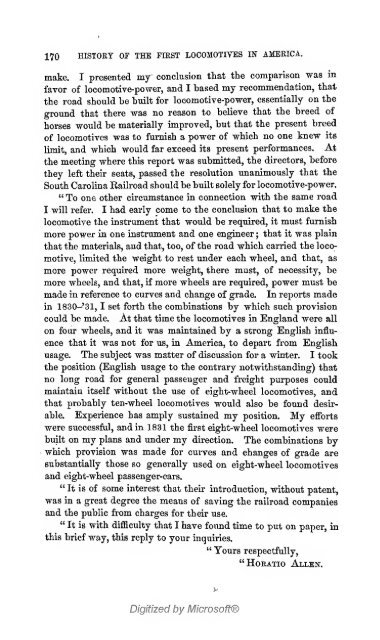The history of the first locomotives in America. From original ...
The history of the first locomotives in America. From original ...
The history of the first locomotives in America. From original ...
Create successful ePaper yourself
Turn your PDF publications into a flip-book with our unique Google optimized e-Paper software.
170 HISTOET OF THE FIRST LOCOMOTIVES IN AMERICA.<br />
make. I presented my conclusion that <strong>the</strong> comparison was <strong>in</strong><br />
favor <strong>of</strong> locomotive-power, and I based my recommendation, that<br />
<strong>the</strong> road should he huilt for locomotive-power, essentially on <strong>the</strong><br />
ground that <strong>the</strong>re was no reason to believe that <strong>the</strong> breed <strong>of</strong><br />
horses would be materially improved, but that <strong>the</strong> present breed<br />
<strong>of</strong> <strong>locomotives</strong> was to furnish a power <strong>of</strong> which no one knew its<br />
limit, and which would far exceed its present performances. At<br />
<strong>the</strong> meet<strong>in</strong>g where this report was submitted, <strong>the</strong> directors, before<br />
<strong>the</strong>y left <strong>the</strong>ir seats, passed <strong>the</strong> resolution unanimously that <strong>the</strong><br />
South Carol<strong>in</strong>a Railroad should be buUt solely for locomotive-power.<br />
" To one o<strong>the</strong>r circumstance <strong>in</strong> connection with <strong>the</strong> same road<br />
I will refer. I had early come to <strong>the</strong> conclusion that to make <strong>the</strong><br />
locomotive <strong>the</strong> <strong>in</strong>strument that would be required, it must furnish<br />
more power <strong>in</strong> one <strong>in</strong>strument and one eng<strong>in</strong>eer ; that it was pla<strong>in</strong><br />
that <strong>the</strong> materials, and that, too, <strong>of</strong> <strong>the</strong> road which carried <strong>the</strong> loco-<br />
motive, limited <strong>the</strong> weight to rest under each wheel, and that, as<br />
more power required more weight, <strong>the</strong>re must, <strong>of</strong> necessity, be<br />
more wheels, and that, if more wheels are required, power must be<br />
made <strong>in</strong> reference to curves and change <strong>of</strong> grade. In reports made<br />
<strong>in</strong> 1830-'31, 1 set forth <strong>the</strong> comb<strong>in</strong>ations by which such provision<br />
could be made. At that time <strong>the</strong> <strong>locomotives</strong> <strong>in</strong> England were all<br />
on four wheels, and it was ma<strong>in</strong>tauied by a strong English <strong>in</strong>flu-<br />
ence that it was not for us, <strong>in</strong> <strong>America</strong>, to depart from English<br />
usage. <strong>The</strong> subject was matter <strong>of</strong> discussion for a w<strong>in</strong>ter. I took<br />
<strong>the</strong> position (English usage to <strong>the</strong> contrary notwithstand<strong>in</strong>g) that<br />
no long road for general passenger and freight purposes could<br />
ma<strong>in</strong>ta<strong>in</strong> itself without <strong>the</strong> use <strong>of</strong> eight-wheel <strong>locomotives</strong>, and<br />
that probably ten-wheel <strong>locomotives</strong> would also be found desir-<br />
able. Experience has amply susta<strong>in</strong>ed my position. My efforts<br />
were successful, and <strong>in</strong> 1831 <strong>the</strong> <strong>first</strong> eight-wheel <strong>locomotives</strong> were<br />
built on my plans and under my direction. <strong>The</strong> comb<strong>in</strong>ations by<br />
^ which provision was made for curves and changes <strong>of</strong> grade are<br />
substantially those so generally used on eight-wheel <strong>locomotives</strong><br />
and eight-wheel passenger-cars.<br />
" It is <strong>of</strong> some <strong>in</strong>terest that <strong>the</strong>ir <strong>in</strong>troduction, without patent,<br />
was <strong>in</strong> a great degree <strong>the</strong> means <strong>of</strong> sav<strong>in</strong>g <strong>the</strong> railroad companies<br />
and <strong>the</strong> public from charges for <strong>the</strong>ir use.<br />
" It is with difiiculty that I have found time to put on paper, <strong>in</strong><br />
this brief way, this reply to your <strong>in</strong>quiries.<br />
Digitized by Micros<strong>of</strong>t®<br />
" Yours respectfully,<br />
"HoEATio Allen.
















